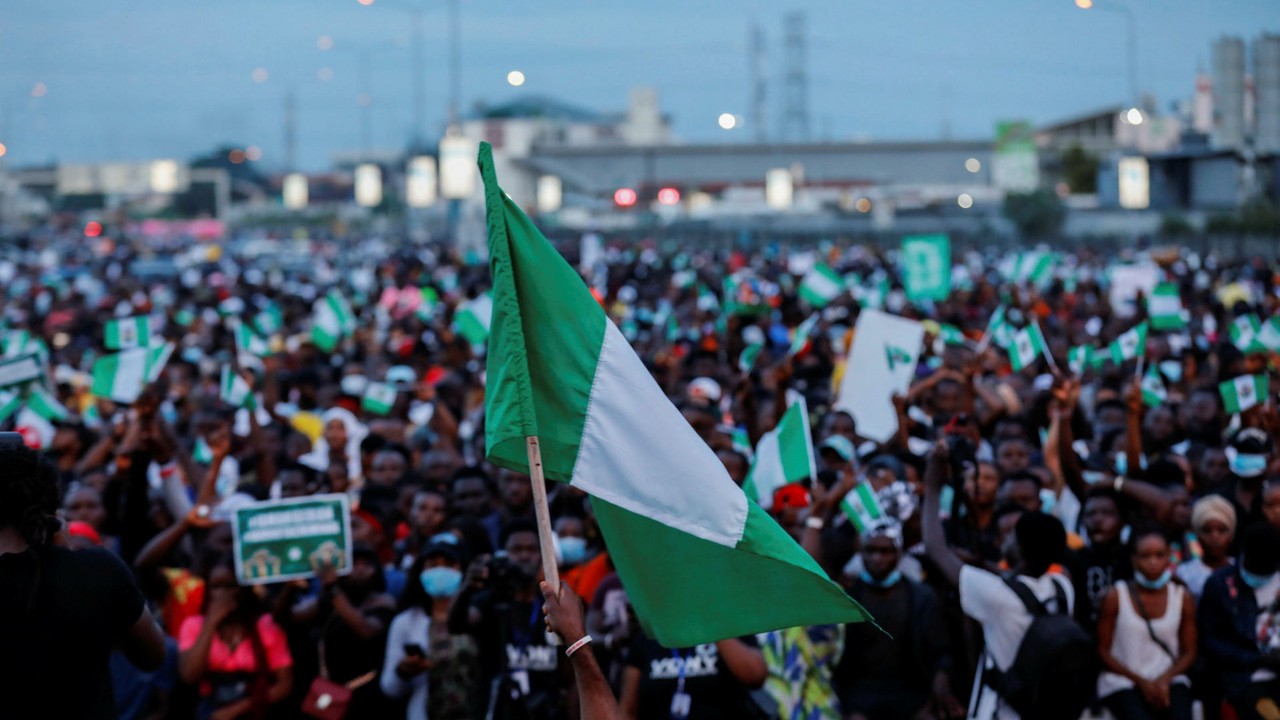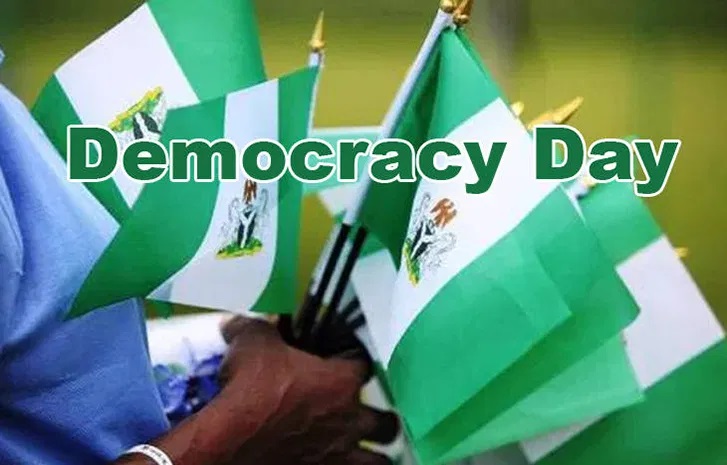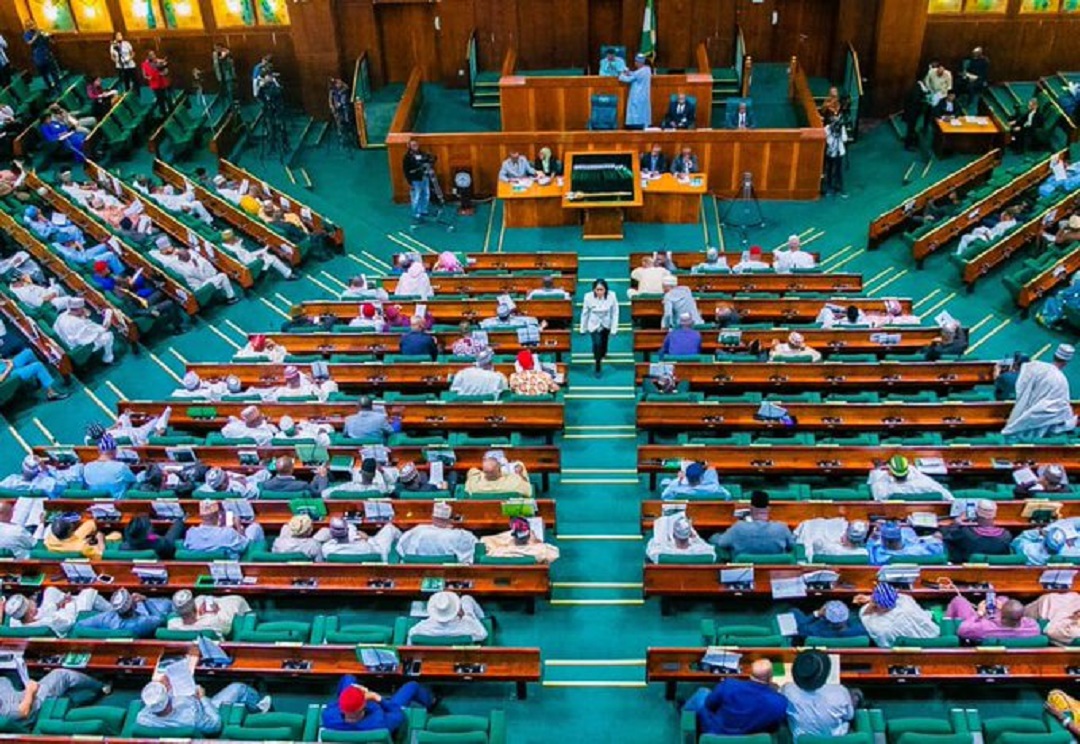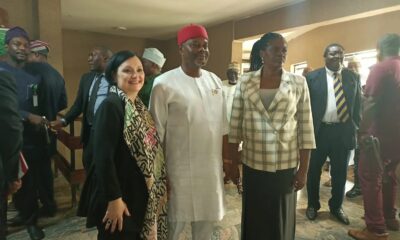Editorial
Nigeria and the Jericho syndrome

According to the Christian bible, after the Israelites conquered Jericho, Joshua placed a curse upon whoever ever considered its rebuilding. At the cost of his firstborn shall he lay its foundation, and at the cost of his youngest son shall he set up its gates, he said. Not so different, the endless travails of whoever tries to rebuild Nigeria. Umaru Musa Yar’Adua, being a most recent example on the part of leaders, while thousands of Nigeria have fallen under the heels of the wickedness of other self-seeking politicians, whose ambitions are deemed worthy of the blood of Nigerians.
Whoever considers rebuilding Nigeria from its foundations, if they do not lose their lives, lose financial security due to a deliberate network of greed. The reader is encouraged to try to remember the names of people who died as a result of election violence in the last election. It is possible that one will pull a blank if one is not a journalist, and even journalists will remember less than three names.
Alexander the Great once remarked, “I would rather live a short life of glory than a long life of darkness.” This is because the Grecian world accorded sacrifice for country its due value. This narrative is reflected in Christ’s day, saying, “There is no greater love than this: that a person would lay down his life for the sake of his friends.”
One could argue that the reason any life is worth laying down is because it will be remembered. Nigeria makes it such that to die for country is to be forgotten. Its annals of history are populated by genocidal leaders, self-seeking tribalists, and those who are actually remembered for their good works are so remembered because the light of their actions could not be put out by the amnesiac culture. This is why loyalty to country is lacking. Why would anyone want to die for a country that merely considers you a statistic?
Unless you are the President’s son in a power bike accident, medical care is promised to be sub-optimal. As long as you are the child of a Senator, buying a kidney is just another Tuesday. Nigeria deifies the inordinate and criminalises the hallowed.
To rebuild would require a generation of people who are fearless in the face of guns at Ozumba Mbadiwe. To rebuild Nigeria will require the press to not be the puppet sock of the powers that be. To rebuild Nigeria will require a portion of politicians to damn the consequences of election primaries, not kowtowing to godfathers for the sake of the people, the mission of liberation. To rebuild Nigeria would require a loss of many firstborns and last borns.
To rebuild Nigeria would require a culture of remembering the blood spilled for the cause of rebuilding. Until we attain this collective realisation, the Japa wave of young and old alike will be unending. Our churches and mosques will continue to pray to God for solutions he has put in our hands and hearts.
“The arc of the moral universe is long, but it bends towards justice,” Dr. Martin Luther King Jr. said some days to his death. And it did bend towards justice, and will continue to bend. We are full of hope for this cause. We need better leaders, but more importantly, we need better citizens.
Editorial
The role of individual actions in combating Cholera


The recent cholera outbreak in Nigeria has sparked concerns, particularly in Lagos and several other states. The National Biosafety Management Agency has urged the public to exercise extreme caution amidst reports of 30 fatalities and 1,141 suspected cases.
Enhanced hygiene measures are crucial at this time, alongside concerted government efforts to aid those affected.
The outbreak has affected Bayelsa, Zamfara, Abia, Cross River, Bauchi, Delta, Katsina, Imo, Nasarawa, and Lagos, raising fears of potential further spread.
With the upcoming Salah celebrations, it is imperative for Nigerians to grasp the seriousness of the situation and implement immediate preventive actions to safeguard themselves and their families.
Cholera, caused by the bacterium Vibrio cholerae, spreads through contaminated food and water in unsanitary conditions. Symptoms such as severe diarrhea, vomiting, and rapid dehydration necessitate prompt medical attention to prevent fatalities.
While cholera has been eradicated in more developed regions for over a century, it remains a periodic challenge in Nigeria, largely due to poverty and inadequate hygiene practices, according to the Global Task Force on Cholera Control.
The World Health Organisation reported cholera outbreaks in 23 countries across Africa and the Eastern Mediterranean in 2021, a number that rose to 29 countries in 2022.
In response, the NBMA, working closely with health authorities, is actively monitoring and implementing measures to contain the spread of the disease. Director-General Agnes Asagbra stressed the importance of individual and community actions in combating the outbreak.
Nigerians are urged to ensure all drinking water is boiled or purified using approved methods. Maintaining proper hand hygiene is critical: hands should be washed thoroughly with soap and water before eating, preparing food, and after using the toilet to reduce infection risks.
Additionally, food should be cooked thoroughly and consumed hot, while raw foods like fruits and vegetables should only be consumed if they can be peeled or washed with safe water. It is advisable to avoid fruits that cannot be peeled at this time.
Maintaining clean environments and proper waste disposal are crucial in preventing contamination and combating cholera outbreaks.
While individual efforts are vital, effective government intervention is equally essential. State governors, health commissioners, and relevant authorities must establish robust health surveillance systems to promptly detect and respond to outbreaks. Public awareness campaigns should intensify to educate citizens on cholera prevention and the significance of hygiene practices.
Governments must ensure all communities access clean, safe drinking water by establishing emergency purification stations in affected areas and improving existing water infrastructure. Continuous water provision throughout the year is imperative.
Healthcare facilities need adequate supplies and trained personnel to manage cholera cases, including rehydration solutions and antibiotics. Collaboration with international health organisations can offer additional resources and expertise to effectively contain outbreaks.
Health commissioners must act proactively to prevent fatalities, implementing timely interventions and maintaining transparent communication with the public. There should be zero tolerance for open defecation, a significant contributor to cholera outbreaks.
Governments must enforce regulations against public defecation, provide secure public toilet facilities with running water, and ensure their maintenance.
The recent cholera outbreak in Lagos underscores the urgent need for collective action and responsibility in safeguarding public health across Nigeria. By adhering to hygiene protocols and implementing comprehensive preventive measures, we can protect communities and overcome this challenge together.
The cholera outbreak constitutes a public health emergency demanding urgent and thorough intervention. Nigeria can mitigate further losses by promoting hygiene practices, ensuring access to clean water, and sustaining a vigilant health surveillance system.
It is important that Nigerians heed the NBMA’s warning and collectively assume responsibility for their health and safety.
Addressing cholera requires a united effort from the government, health authorities, and citizens alike. The time for action is immediate.
Editorial
Democracy without attendant economic development


Nigeria may have celebrated twenty-five years of unbroken democracy, but how have its citizens fared? It is no longer news that Nigeria and Nigerians are passing through one of the worst times in the history of the country, with high cost of living, abject poverty staring them in the face.
No wonder pundits and well-meaning Nigerians, especially the youths defied threats of harassment and possible arrest by. security operatives in Lagos, Ogun, Osun and Oyo States, among others to protest against hardship induced by bad leadership that has impoverished the entire nation since 1999.
It is important to mention that Nigeria gained independence from the British colonial masters on October, 1 1960 and has since been ruled by Nigerians. The first, second and third republics are testimonials to that claim. So celebrating just twenty-five years of democracy could amount to half truth.
But what has changed? The economic indices of the 1960s are still very much with us today. Epileptic power supply, unemployment, inflation, insecurity, among several others that are still staring us on the face.
So what are we really celebrating? Yes, President Ahmed Bola Tinubu has catalogued the sacrifices made by Nigerians, some even paid supreme price with their lives to preserve democracy, but what have we, the immediate beneficiaries of the struggle done to protect it?
Everybody craves the preservation of democracy, often referred to as nascent in Nigeria, but a sixty-three-year old man cannot be said to be underraged. Let us therefore stop hiding under nascence to defend our inadequacy or outright failure.
We strongly disagree that at sixty-three, Nigeria should remain underdeveloped to the extent that electricity supply is nothing remarkable, unemployment holding sway, road networks deplorable, insecurity a perpetual challenge, and worse still, high cost of living at its peak.
What has happened to the resumption of production by our refineries, especially Port Harcourt Refinery? Dangote Refinery is on everyone’s lips. If an individual can build a refinery within a reasonable time frame, why can’t a nation do better? It amounts to absolute failure on the part of the leaders.
What has happened to the textile industry that employed a whole chunk of the population? What about manufacturing companies such as Michelin, Dunlop, Nigerian Engineering Works (NEW), CFAO, SCOA Motors etc?
If we cannot provide an enabling environment for business to thrive, which forces most of these foreign companies to relocate to other countries, let us establish our own local companies that can run without electricity. It is disturbing that some fundamental projects that can serve as catalyst to Nigeria’s industrialisation, such as the Ajaokuta Steel Industry, Kogi State, Aluminium, Smelting Company, Ikot-Abasi in Akwa Ibom State have remained perpetually uncompleted and we are comfortable importing fuel and other petroleum products after throwing away our crude oil, in the name of exportation.
Nigeria is now battling with high cost of living, induced by the so-called removal of fuel subsidy. A custard rubber of garri now sells for N5,000, rubber of rice costs N7,500 to N850,000, a bottle of poorly refined kerosene sells at N2,000 and still salaries of workers remain static. How do we reconcile that?
We cannot talk of democracy without free and fair elections. That is the reason why well-meaning Nigerians are clamouring for free and fair elections. But the greatest resistance is coming from corrupt politicians, who do not have anything to offer in terms of leadership. It is important we enthrone true democracy, where election results will count and not one or two men sitting behind the bench to determine the fate of millions of Nigerians in the name of the judiciary. To achieve that faster, public offices should be made less attractive, so that anybody eyeing any elective office should know that he is going to render service and not planning to plunder public funds.
There must be stringent measures against corrupt officials serving or retired. Most successful countries of the world have adopted such an approach and the citizens are better for it. That is the reason corruption in Asia has become less common. Few public officers in the Asian Continent will dare to meddle into fraud, otherwise the hangman awaits such an officer.
Reverse is the case in Nigeria, or Africa at large. No wonder a politician seeking election will boldly tell us to go to court, provided he wins the election first. And true to it, this has been working out for them. The cases often last till the end of their tenure. If the court were to be the hope of the common man, such a thing wouldn’t happen.
It is also in Nigeria where perpetual injunction exists for public officers. This sounds strange, isn’t it? But it happens in Nigeria! A former president in Nigeria had identified the judiciary and the Independent National Electoral Commission (INEC) as his greatest headache in the war against corruption in the country and the duo lived up to expectations by frustrating every move he made to tackle corruption while his tenure lasted.
In other words, democracy is good, but Nigerian democracy has not lived up to its billing. It could rightly be described as a suffering and smiling kind of democracy, that makes it difficult for the people to experience the dividends of democracy. And democracy without dividends is worse than military dictatorship. At this juncture, it is important that we look at the way forward.
First and foremost, free and fair elections are sacrosanct in any given democracy globally. Results or votes of such transparent elections must be allowed to count. The judiciary is not meant to determine the outcome of elections in an ideal democratic setting, no wonder some credible winners of the nation’s elections have suffered a lot from law officers in the name of technicalities.
The judges now tend to play up technicalities far above evidence. No other thing to do other than ensuring that INEC conducts a credible, free and fair election, devoid of controversy that will not warrant the matter ending up at the court. We equally suggest that election riggers should be severely punished according to the law of the land. Where such laws are too light for possible electoral offenders, it should be amended to suit the purpose.
The current over-bloated bills on cost of governance should be cut down, the only attraction to public office should be knack for service. Again, power supply must be stable and constant to encourage investors, who will in turn create employment through their investments. Critical projects such as the Ajaokuta Steel Industry, Aluminium Smelting Company and the likes that are geared towards industrialisation of the country must be completed and allowed to run optimally.
If the above stated measures are taken, Nigeria will vacate its third world country status, and this is when celebration of democracy will make meaning for majority of the populace.
Editorial
Is six-year single tenure for President Nigeria’s problem?


Just yesterday about 30 lawmakers at the Green Chamber of the National Assembly proposed a six-year single tenure for President and Governors in the political architecture of this country among other sundry issues. The question that has been pondering on my mind at this critical period is that Nigerians’ problem?
These House of Representatives members whom are accorded esteemed regard by the people are fully aware of the lapses in the basics amenities like the skyrocketed inflation, epileptic electric supply, insecurity, high rates of unemployment, the lingering issue of minimum wage and hunger lavishing the land but decided to give deaf ears to this outcries.
Last two weeks on May 29, the ruling political elite marked 25 years of the reinstitution of democracy in Nigeria after very difficult years of successive military dictatorship. We remember the enthusiasm and hope that accompanied the return of that system of government to the country. Nigerians who prayed for civilian rule, based on democratic principles, had hoped that at its silver jubilee, it should have brought success stories to the nation in all ramifications and the citizens would have a feel of the boundless wealth that the country is blessed with.
But as the nation awaits the rescheduled Democracy Day, June 12, the bliss that the citizens expected at the inception of this new era is increasingly diminishing with unprecedented speed because of poor governance inflicted on the people by political operators who emerged in public offices through a flawed process.
In our considered opinion, democracy as a system of governance is not to blame because in other climes it has yielded massive returns for the people in terms of social security, infrastructure development, political and economic stability, peace, security, science, technology and innovation.
We can draw examples from the People’s Republic of China, under communist democracy. The Communist Party of China (CPC) has, through strategic thinking, creativity and massive investment in human capital, recruited the abundant human intelligence and intellect of the people to build a prosperous nation, which is today one of the most important manufacturing hubs in the world.
There are other thriving examples of where democracy works for the people around the world including in African countries. The problem is not the system but the individuals who operate it. We acknowledge the fact that liberal democracy, in itself, may not necessarily guarantee good governance and economic development, but it remains a system that opens up bountiful opportunities for citizens to have the freedom to interrogate the aggregate values and variables of their society and create collective channels to attain greatness through effective leadership.
The challenge of democracy in Nigeria is lack of good leadership at multiple levels and this has enormous drawbacks on the lives of the people. Experts claim that there is a paradoxical relationship between democracy and development in Nigeria. In the 20 years of electoral democracy, poverty, inequality, unemployment, underemployment and insecurity have increased. The hopes of citizens that democracy would lead to improved living standards have been dashed. Social justice and inclusive sustainable development have also been elusive. This, in our opinion, is not a failure on the part of democracy as a system but the inefficiencies brought about by the fabled human factor.
Curiously, and in spite of the beauty of the ballot box, the Nigerian economy has remained dependent on oil and gas with very low value-added services. The aspiration that by 2020, Nigeria would become one of the 20 leading economies in the world has not been achieved essentially because of an abysmal lack of commitment by the political elite who have captured the state for personal gains.
We are appalled that 25 years of democracy has brought untold misery to Nigerians at multiple levels. The situation has become worse in the last nine years. Today, inflation has hit 33.69 percent according to the National Bureau of Statistics (NBS). This has caused a heightened increase in the prices of food and other essential commodities in the country putting most of them beyond the reach of the ordinary citizen whose income is miserably stagnated.
Furthermore, unemployment has reached alarming levels creating a system which provides solace only to relations of political office holders and their acolytes. It is not surprising, therefore, that the poverty rate is such that in 2023, Nigeria, officially, was rated as having 63 percent of its population suffering multidimensional poverty. Sadly, in our view, policies, such as the removal of fuel subsidy, are not helping matters when not done right. That policy, in particular, abruptly announced has worsened an already precarious situation due to lacklustre implementation, giving rise to an environment whereby citizens pay more for fuel and other items, whose prices have been pushed beyond limits by that otherwise good decision.
Another policy that has triggered a humongous crisis is the floating of the naira that grossly reduced the value of the currency vis-à-vis other international media of exchange and brought massive pain and hardship to bear on the lives of the citizenry.
Compounding this awkward scenario is insecurity which has so ravaged the country ranging from terrorism, banditry, farmers- herders clashes in the north and unknown gunmen and the menace of separatist agitators in the south.
Despite these seemingly insurmountable crises, we are of the opinion that the best is still possible for Nigeria. But the citizens must come out and set a standard for electing leaders on personal merit and character instead of the so pervasive ethnic and religious motivated choices. The need for an urgent reversal of this mindset is immensely compelling because, in the long run, it is the entire populace that pays the price of any mistake of omission or commission
Pertinently, as President Ahmed Tinubu crowned his government with the celebration of Democracy Day today. The political elites have a rethink to reintroduce people interest programmes and policies that will serve as a succour to the lapses on the land.












